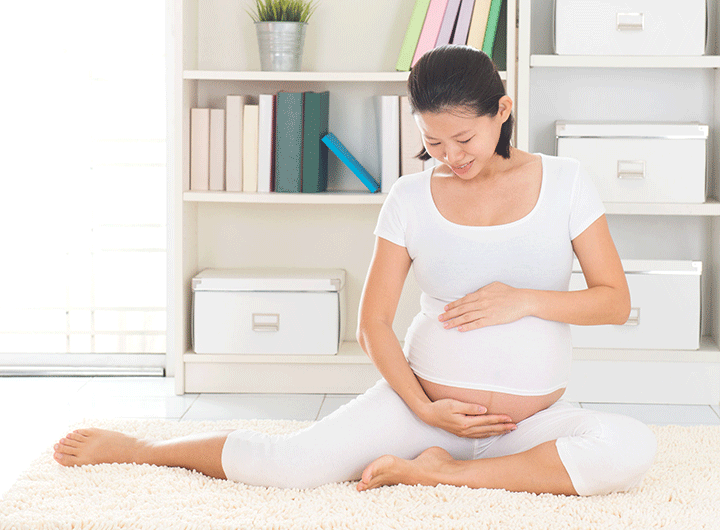Pregnancy Care
Morning Sickness During Pregnancy: 7 Tips to Ease Nausea

Morning sickness is one of the early signs of pregnancy, affecting over half of all pregnant women. It is common to experience some morning sickness during early pregnancy, however, some pregnant women do experience severe nausea and vomiting, which may require medical attention.
What Is Morning Sickness?
Morning sickness is nausea and vomiting that occurs during pregnancy, especially during the first 3 months (first trimester). Despite its name, morning sickness is a misnomer for many pregnant women as it can happen at any time of the day, and not just in the morning
What Causes Morning Sickness?
The exact cause of morning sickness is not known, but some factors may include:
- Rising hormone levels, such as estrogen, progesterone, and human chorionic gonadotropin (HCG), resulting in changes in one’s digestive activity. This causes nausea and vomiting from indigestion.
- Sensitivity towards certain scents or smells.
- Excess saliva production which can increase the feeling of nauseousness.
- Metallic taste in your mouth (dysgeusia) due to alterations in taste buds from fluctuating hormone levels.
Although morning sickness can cause discomfort, it is generally harmless and does not require immediate medical attention. In fact, you can try to alleviate morning sickness with some simple home remedies and changes in lifestyle habits.
Here are 7 tips to ease nausea:
1. Rest As Much As You Can
Pregnancy can be a very exhausting process. With your body working extra hard to grow your foetus, coupled with hormonal changes, many tend to feel queasy and fatigued.
The most straightforward solution is rest. Nausea tends to increase with fatigue as your body burns off energy reserves to keep you active. As such, try to have enough sleep at night (at least 7 hours) and if you feel sleepy during the day, get some rest if you can.
2. Be More Careful About What You Eat
What you eat during pregnancy is extremely vital, as you are not only feeding yourself but also the growing baby inside you. A pregnancy diet high in complex carbohydrates and protein can provide the essential nutrients for both you and your baby, as well as combat nauseousness. There are also certain kinds of foods that you can include in your diet to ease the queasiness.
Some of these foods include:
- Easily digestible foods such as rice, toast, crackers, dry cereal and banana
- Protein-rich foods such as nuts and eggs
- Citrus fruits such as lemons and oranges
- Ginger (in biscuits, sweets, tea or even freshly grated into dishes) is known to aid digestion and reduce nausea.
You should also try to avoid fatty, greasy or spicy foods as much as possible as they can irritate your stomach and aggravate your nausea.
It is also important to plan small but frequent meals throughout the day. This will prevent your digestive tract from overworking from a full meal, which may worsen your nausea instead.
3. Get Enough Vitamins
Vitamin supplements such as Vitamin B6 can help ease nausea. However, you should only consume vitamins prescribed by your ob-gyn and under their supervision. If you still feel nauseous or even worse after taking these vitamin supplements, you should immediately consult your ob-gyn.
4. Drink Enough Water
Dehydration can worsen your nausea, as such, it is vital to remain hydrated and consume enough fluids during pregnancy.
It is best to drink plain water (at least 6 glasses) throughout the day. Alternatively, fruit juices, ginger tea or fruits with high water content such as melons can also be a good substitute for plain water to ensure you remain hydrated.
Avoid caffeine-rich drinks (such as coffee or soda) and milk, as they can make you even more dehydrated and further upset your stomach.
5. Avoid Offensive Smells
Your sense of smell is heightened during pregnancy due to rising hormone levels. Certain scents that you previously found pleasant may suddenly smell bad when you are pregnant.
You will slowly discover which scents aggravate your nausea along the way during your pregnancy stages and learn to avoid them.
6. Stay Physically Active
Simple, low-intensity activities such as walking, swimming or even yoga can help you remain physically active and reduce nausea.
Exercising after meals also aid in digestion, reducing irregular digestive activity and improve your nausea
7. Consider Acupressure and Aromatherapy
Acupressure and aromatherapy are options to consider in helping to reduce discomfort and ease nausea.
Acupressure involves applying pressure on specific points on your body, typically the forearm or wrist. This can help to relieve nausea and other stomach-related problems such as indigestion.
Alternatively, aromatherapy uses scents that are generally known to be pleasant across most pregnant women, such as peppermint oil, lemon extract or rosemary, to reduce nausea. The therapeutic use of essential oils is known to help relieve stress and also boost the quality of your sleep.
Conclusion
Morning sickness is a completely normal symptom during pregnancy. While there is no known cure for it, you can try to ease your nausea using the above 7 tips and simple home remedies.
The good news is that morning sickness tends to disappear after the first trimester, though some pregnant women may still experience some form of nausea even till the later pregnancy stages.
However, if you experience severe nausea even after adopting the above tips, you should seek immediate medical attention with your ob-gyn.
Read this next ...
WHO WE ARE
About SOG Health Pte. Ltd.
Established in 2011, SOG Health Pte. Ltd. (“SOG”) is a leading healthcare service provider dedicated to delivering holistic health and wellness services to the modern family.
With a long and established track record in Singapore providing Obstetrics and Gynaecology (“O&G”) services such as pre-pregnancy counselling, delivery, pregnancy and post-delivery care, the Group has since further expanded its spectrum of healthcare services to include Paediatrics, Dermatology, and Cancer-related General Surgery (Colorectal, Breast & Thyroid).
The Group’s clinics, under its four operating segments of O&G, Paediatrics, Oncology and Dermatology, are strategically located throughout Singapore to provide easy access to its patients.
- Obstetrics
- Gynaecology
- GynaeOncology
- Breast, Thyroid & General Surgery
- Colorectal, Endoscopy & General Surgery
- Dermatology
- Paediatrics
Consult With A Specialist From SOG
Visit one of our specialists today to learn more about your health!
Recommended Specialists
Book An Appointment
Fill up this form and our clinic will get back to you shortly.
For general enquiries, please click here.








